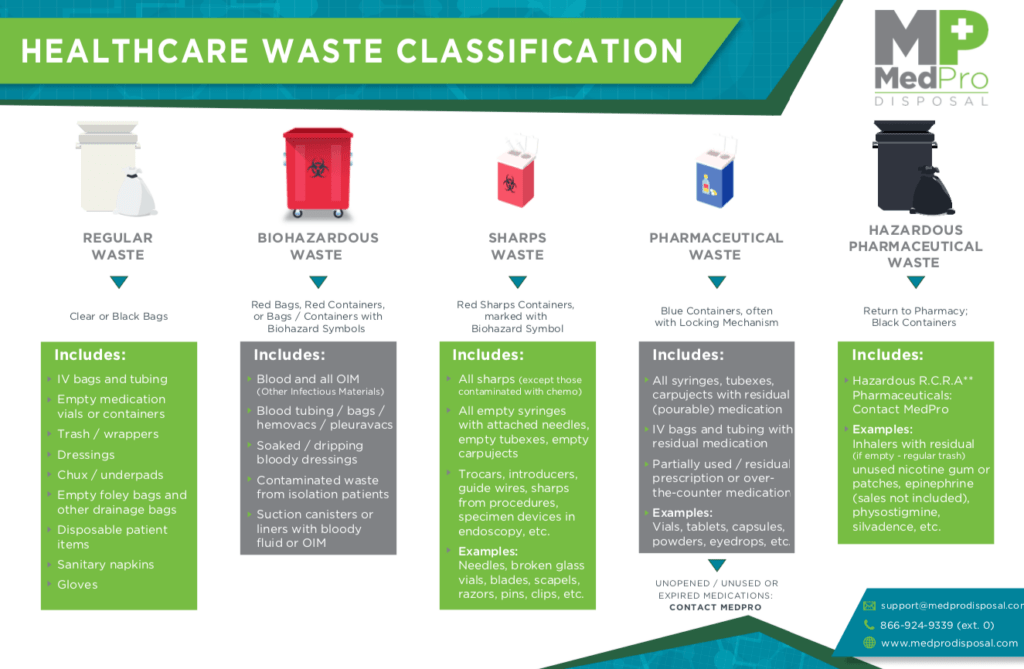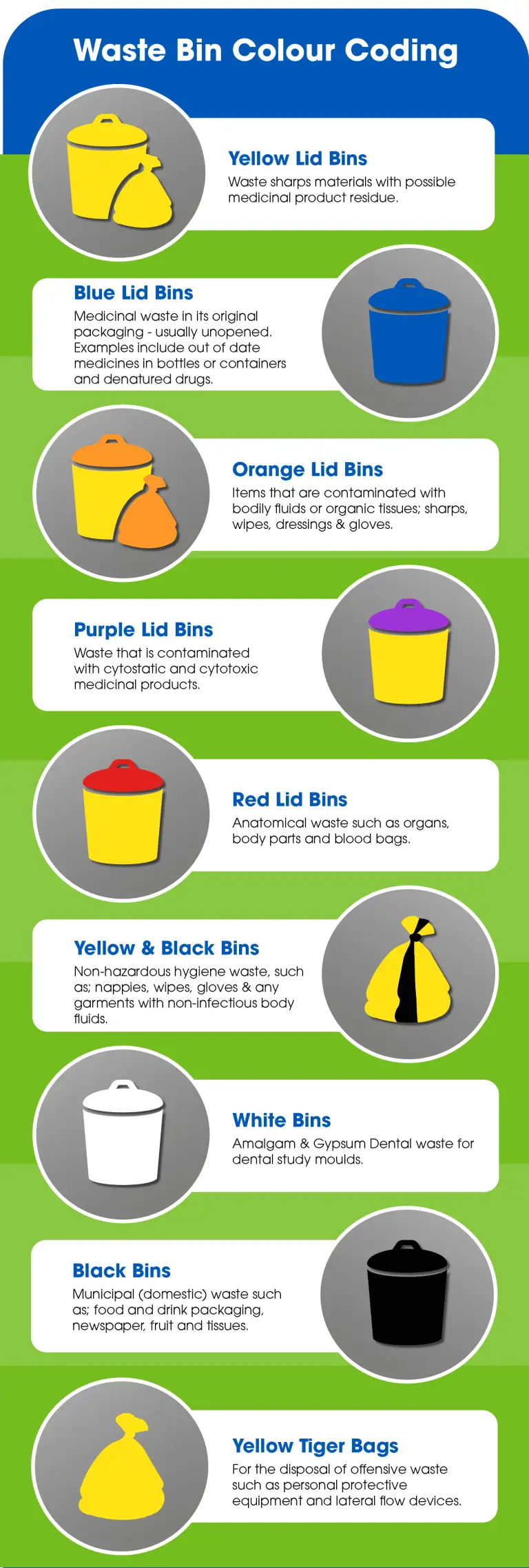Eco-Friendly Solutions for Medical Waste Removal: Focusing On Safety And Security and Conformity
Wiki Article
Guaranteeing Safe Handling and Disposal of Medical Waste
Making certain secure handling and disposal of clinical waste is of vital significance in healthcare setups. Inappropriate monitoring of medical waste can position significant risks to the setting, public health, and medical care employees. In this intro, we will certainly explore the importance of correct medical waste monitoring, the risks connected with inappropriate handling and disposal, as well as the guidelines and methods that can be implemented to ensure its safe disposal.Relevance of Proper Clinical Waste Administration
Correct medical waste monitoring is of utmost significance in ensuring the security and well-being of health care professionals, individuals, and the public. Clinical waste refers to any type of waste produced by medical care facilities throughout the diagnosis, therapy, or immunization of animals or human beings. This waste can position significant health and wellness threats if not taken care of and gotten rid of correctly.
Among the main reasons appropriate medical waste administration is essential is to stop the spread of infectious illness. Clinical waste, such as made use of needles, contaminated dressings, and biological materials, can lug harmful microorganisms. Otherwise handled and taken care of correctly, these virus can be transmitted to health care employees, people, waste handlers, and also the public, causing the potential outbreak of conditions.
Furthermore, correct medical waste monitoring aids secure the setting - medical waste disposal. Clinical waste contains dangerous materials, including chemicals, pharmaceuticals, and radioactive compounds. When not taken care of properly, these compounds can infect dirt, water bodies, and the air, posturing a substantial danger to ecological communities and public health
Furthermore, effective medical waste management guarantees compliance with worldwide requirements and regional guidelines. Governments and regulative bodies have developed methods and standards to ensure the safe handling, storage, transportation, and disposal of clinical waste. Following these laws is important to prevent legal effects and maintain the reputation and credibility of medical care centers.
Threats of Improper Handling and Disposal

If clinical waste is not appropriately disposed of,Individuals can additionally be revealed to these transmittable conditions. If contaminated needles or various other sharps are not disposed of in designated puncture-proof containers, they may accidentally prick clients, leading to prospective infections. Additionally, if medical waste is not segregated effectively, there is a threat of cross-contamination in between different sorts of waste, more raising the opportunities of illness transmission.
Improper disposal of medical waste can likewise have harmful effects on the environment and the public. If medical waste is not dealt with and dealt with appropriately, it can pollute water sources, dirt, and air, causing the spread of contaminants and diseases. This can have lasting repercussions on communities and public health.
Standards for Safe Handling of Medical Waste
Executing reliable procedures for the safe handling of clinical waste is vital in ensuring the defense of healthcare professionals, people, and the public. These standards are essential in minimizing the dangers related to the handling and disposal of medical waste, such as infections, injuries, and ecological pollution.Most importantly, healthcare centers must establish a thorough waste management strategy that sticks to local, nationwide, and international guidelines. This plan must consist of clear directions on waste partition, packaging, labeling, transportation, and storage space. It is crucial to divide various kinds of waste, such as sharps, contagious products, drugs, and non-hazardous waste, to avoid cross-contamination and promote risk-free disposal.
Additionally, health care personnel should get comprehensive training on appropriate waste handling strategies. They should be educated on the prospective risks of medical waste, the proper usage of individual safety equipment (PPE), and the appropriate procedures for managing, transporting, and disposing of different types of waste.
Moreover, medical care centers ought to consistently monitor and investigate their waste monitoring techniques to make certain conformity with standards. This includes carrying out normal inspections, assessing waste handling procedures, and providing feedback and training to staff participants.
Reliable Approaches for Garbage Disposal
To make sure the risk-free handling and disposal of medical waste, it is necessary to employ effective approaches for garbage disposal. Medical waste can position significant threats to public wellness and the atmosphere if not handled and gotten rid of correctly. Healthcare facilities and waste monitoring companies have to implement suitable strategies to mitigate these threats.One efficient strategy for garbage disposal is segregation. It entails separating various sorts of medical waste based upon their qualities. Partition enables the proper therapy and disposal of each waste classification, reducing the possibility for contamination or harm. Medical care facilities need to supply clear standards and training to employee on how to set apart waste correctly.

Furthermore, healthcare facilities ought to work together with accredited waste monitoring firms to make certain correct disposal of clinical waste. These companies have the experience and equipment required to securely get rid of and handle of medical waste in conformity with guidelines and ideal practices.
Training and Education And Learning for Medical Care Professionals
Medical care specialists play a crucial role in guaranteeing the safe handling and disposal of clinical waste via thorough training and education and learning. It is necessary for doctor to have a deep understanding of the prospective dangers associated with clinical waste and the correct procedures for its administration. By receiving proper training, medical care specialists can lessen the prospective transmission of infectious conditions, stop ecological contamination, and safeguard both themselves and the public.
Additionally, training programs must emphasize using individual protective tools (PPE) and appropriate hand health practices when managing medical waste. medical waste removal. Health care professionals need to know exactly how to correctly dispose and utilize of PPE to protect themselves from prospective direct exposure to hazardous materials. They should also be informed on the importance of regular handwashing and the proper use of hand sanitizers to lessen the spread of transmittable conditions
Continuing education and normal updates on medical waste management methods are essential for health care specialists. As standards and policies advance, it is necessary to keep doctor notified regarding any kind of adjustments in protocols and best practices. This will make sure that they remain current and keep a high criterion of safety and security in handling and disposing of medical waste.
Final Thought
In final thought, appropriate handling and disposal of medical waste is crucial to make certain the safety and security of health care experts, clients, and the environment. By sticking to these methods, we can reduce the possible visit their website risks associated with clinical waste.Medical waste refers to any kind of waste produced by healthcare centers during the medical diagnosis, treatment, or booster shot of people or animals. If clinical waste is not segregated properly, there is a danger of cross-contamination in between different kinds of waste, additional increasing the opportunities of disease transmission.
It is essential to separate various types of waste, such as sharps, contagious materials, pharmaceuticals, and non-hazardous waste, to protect against cross-contamination and promote secure disposal. WasteX Medical Waste Disposal.
To make sure the safe handling and disposal of medical waste, it is crucial to employ reliable techniques for waste disposal. Furthermore, medical care facilities must develop a regular waste collection and transportation timetable to avoid waste accumulation and minimize the risk of crashes or contamination.
Report this wiki page